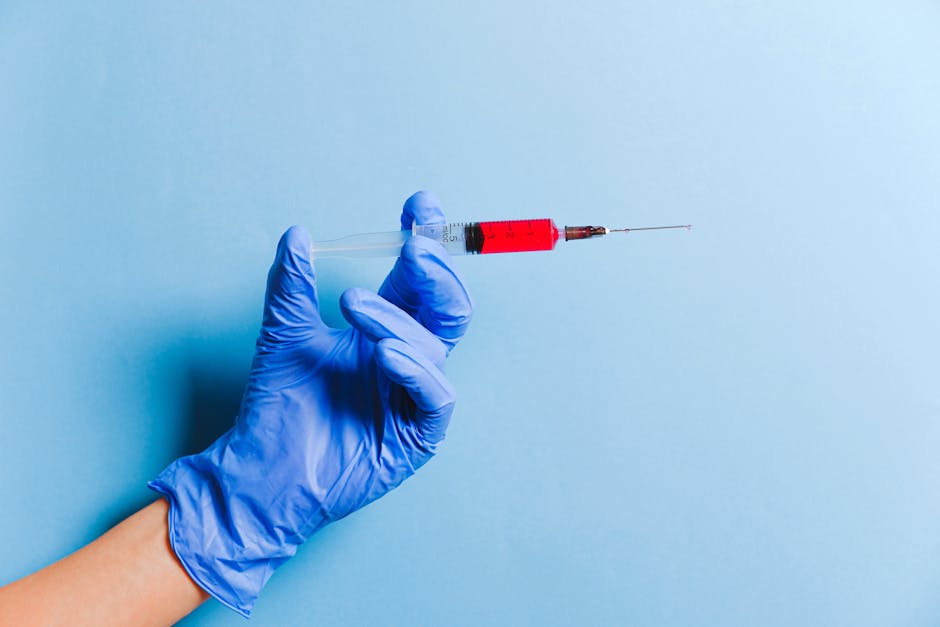
A Comprehensive Guide to Hormone Treatment: Testosterone Options
Introduction: Understanding Testosterone and Its Role in the Body
If you’re a middle-aged individual, have you noticed a decrease in energy, weight gain, or a drop in your libido? Fret not, as you’re not alone. These are common signs of aging experienced by many, and they could potentially signal a drop in testosterone levels.
Testosterone Levels Quick Facts:
* Testosterone is the primary male sex hormone.
* It plays a critical role in bone density, fat distribution, muscle strength, body hair, sex drive, and many more aspects of your health.
* Testosterone levels peak in early adulthood and slowly decline about 1% per year after 30 or 40.
* Symptoms of low testosterone can include changes in sexual function, physical changes, and emotional changes.
At R2 Medical, we understand the significant role testosterone plays in maintaining men’s health. We are here to guide you on the journey of understanding this crucial hormone, its role in your body, and how its decrease can potentially affect you.

In the following sections, we’ll describe in detail the importance of testosterone in men’s health, how to recognize the signs and symptoms of low testosterone, and understand the natural decline of this hormone with age. Our aim is to help you make informed decisions about potentially seeking treatment, such as Testosterone Replacement Therapy (TRT), to manage your symptoms and improve your overall health and well-being.
While testosterone levels naturally decrease as we age, a significant drop resulting in symptoms can be a signal to seek professional help. Let’s embark on this journey of understanding together, with your health and comfort as our primary concern. This is your comprehensive guide to understanding testosterone and the potential treatment options.
Evaluating Testosterone Levels and the Need for Treatment
You’ve learned about the importance of testosterone and the signs of low levels. Now, let’s delve into how we, at R2 Medical, evaluate testosterone levels and decide on the necessity of hormone treatment testosterone.
Testing for Low Testosterone: The Process and Importance
Testing for low testosterone is relatively straightforward. Your doctor will usually order a blood test, often done first thing in the morning when testosterone levels are highest. However, your levels fluctuate throughout the day, so you might need more than one blood test at different times to get an accurate reading.

The normal testosterone range for men is between 300 to 1,000 ng/dL. However, symptoms can present at different levels for different people. Some individuals may start experiencing symptoms around 250 ng/dL, while others may not notice anything until their level is at 150 or even 100.
When is Testosterone Replacement Therapy (TRT) Necessary?
The decision to start Testosterone Replacement Therapy (TRT) is based on symptoms and not just numbers. If you’re experiencing symptoms of low testosterone, such as fatigue, low sex drive, or irritability, and blood tests confirm low testosterone levels, then TRT might be a suitable treatment for you.
However, consider that TRT isn’t recommended for everyone. For instance, if you have low testosterone levels due to aging but don’t exhibit any symptoms, treatment isn’t usually recommended. Also, TRT might not be the best option if you have certain medical conditions. It’s a decision that requires careful consideration and consultation with a medical professional.
The Role of a Medical Professional in Evaluating Testosterone Levels
At R2 Medical, we take a patient-centric approach to evaluating testosterone levels. We don’t just look at your blood test. We consider your symptoms, your overall health, and your personal and family medical history. This comprehensive evaluation helps us determine the best course of action for you.
We believe in empowering our patients with knowledge. We’ll discuss your test results in detail, explain what they mean, and talk about potential treatment options. If TRT is recommended, we’ll explain the benefits, risks, and what you can expect from treatment. Our goal is to help you make an informed decision about your health.
In conclusion, testing for low testosterone is a crucial step in diagnosing and treating symptoms associated with low levels. However, the decision to start TRT should be based on a comprehensive evaluation and thorough discussion with a medical professional. At R2 Medical, we’re here to guide and support you every step of the way.
Exploring Testosterone Replacement Therapy: Benefits, Risks, and Alternatives
When it comes to hormone treatment testosterone, there’s a lot to consider. Everyone’s body is unique and responds differently to therapy. We at R2 Medical are committed to providing the most comprehensive and personalized care possible. Let’s delve into the different forms of testosterone replacement therapy, potential benefits, associated risks, and alternatives to traditional therapy.
Different Forms of Testosterone Replacement Therapy
Testosterone replacement therapy (TRT) can be administered in various forms, each carrying its pros and cons. The main methods include gels and creams, skin patches, injections, and implants.
Gels, creams, and skin patches are convenient and non-invasive, but they might not be as effective as other methods. Injections are relatively inexpensive and effective but require regular administration. Implants or pellets provide a slow release of hormone and are effective but require a minor medical procedure. It’s important to discuss with a healthcare professional which method suits you best.
Potential Benefits of Testosterone Therapy
Testosterone therapy can bring a host of benefits based on individual health status. Many men report improvement in energy level, sex drive, and quality of erections. Testosterone can also increase bone density, muscle mass, and insulin sensitivity in some men. Improvement in mood is often reported by men undergoing testosterone replacement therapy. However, the extent of noticeable effects varies significantly among individuals.
Risks and Side Effects of Testosterone Therapy
While testosterone therapy can provide benefits, it’s crucial to understand the potential side effects or risks. Most common side effects include rash, itching, or irritation where the testosterone is applied. There’s also evidence of a possible increased risk of heart attack or stroke associated with testosterone use.
Specific health conditions like benign prostatic hypertrophy (BPH), prostate cancer and sleep apnea can be worsened by testosterone therapy. The FDA requires a warning about the risk of blood clots in veins, which could increase the risk of deep vein thrombosis and pulmonary embolism.
Given these potential risks, have a thorough discussion with your healthcare provider before starting testosterone therapy.
Alternatives to Testosterone Therapy: Lifestyle Changes and Natural Boosters
While testosterone therapy can be beneficial, it’s not the only route to manage symptoms of low testosterone. Lifestyle changes like maintaining a healthy diet, engaging in regular physical activity, ensuring adequate sleep, and managing stress can significantly improve testosterone levels.
Natural boosters like zinc, vitamin D, and certain herbs can enhance testosterone production. However, these should be used under the guidance of a healthcare professional to ensure their efficacy and safety.
In conclusion, testosterone therapy can be a great option for those struggling with symptoms of low testosterone. However, understand the potential risks and side effects, as well as explore alternatives. At R2 Medical, we’re committed to helping our patients make informed decisions about their health.
Masculinizing Hormone Therapy: A Special Consideration
The Use of Testosterone in Masculinizing Hormone Therapy
Testosterone is not only crucial for men experiencing symptoms of low levels of this hormone but also plays a pivotal role in masculinizing hormone therapy. This therapy is typically used by transgender men and nonbinary individuals to align their physical characteristics with their gender identity. The therapy involves administering testosterone, which can bring about changes such as stopping menstrual cycles and decreasing the ovaries’ ability to produce estrogen (Mayo Clinic). However, it’s important to note that this therapy might lead to health concerns and affect fertility and sexual function, thus necessitating thorough discussions with a healthcare provider.
Physical Changes and Health Monitoring During Therapy
When undergoing masculinizing hormone therapy, physical changes will take place over time. These changes are akin to those experienced during male puberty and can include weight gain and acne. At R2 Medical, we emphasize the importance of regular monitoring throughout the course of the therapy. Through periodic check-ups and laboratory tests, we can track hormone levels, evaluate the patient’s response to treatment, and identify any potential adverse effects. This proactive approach allows us to make timely interventions and modifications to the treatment plan, ensuring that the patient receives the safest and most beneficial therapy (R2 Medical Clinic).
Fertility Considerations and Preservation Options in Masculinizing Hormone Therapy
One significant aspect to consider when opting for masculinizing hormone therapy is its potential influence on fertility. Because testosterone therapy can affect fertility, it’s crucial to discuss this with your healthcare provider before starting the therapy. If preserving fertility is a priority, there might be options available to you, such as sperm or egg preservation (Mayo Clinic).
At R2 Medical, we understand that each patient is unique and has specific needs and concerns. We value a patient-centric approach and are committed to providing individualized hormone treatment testosterone therapies that are safe, effective, and tailored to each patient’s unique situation. Please reach out to us to discuss your options and make an informed decision about your health.
Conclusion: Making an Informed Decision about Testosterone Treatment
As we come to the end of this comprehensive guide, remember that making an informed decision about hormone treatment testosterone is a crucial step towards improved health and well-being.
The Importance of a Patient-Centric Approach in Hormone Treatment
At R2 Medical, we believe in the power of personalized medicine. Each individual has a unique genetic makeup, medical history, and lifestyle factors that can influence hormone levels and their response to treatment. As such, we take a patient-centric approach to testosterone therapy, ensuring that each treatment plan is tailored to each person’s specific needs and circumstances. This focus on individualized care has been shown to optimize treatment results, as found in this study about customizing hormone therapy.
Setting Realistic Expectations for Testosterone Treatment
It’s crucial to set realistic expectations when considering testosterone treatment. While many men report an improvement in energy levels, sex drive, and mood, responses vary from person to person. As mentioned by endocrinologist Karen Herbst, MD, PhD, about 1 in 10 men are “ecstatic” about their response to testosterone therapy, while the same number “don’t notice much.” The majority have generally positive but varying responses. It’s also worth noting that changes associated with hormone therapy can take years to fully develop, especially if the treatment is started later in life.
The Need for Further Research and Regular Monitoring in Testosterone Therapy
While testosterone therapy can offer several benefits, it’s important to remember that its long-term effects are still not fully understood and further research is needed. Moreover, it’s crucial to regularly monitor hormone levels and the patient’s response to treatment to ensure safety and effectiveness. Regular monitoring allows for timely adjustments to the treatment plan and can help identify any potential adverse effects.
At R2 Medical, our team of healthcare professionals is dedicated to providing the highest quality of care, including comprehensive testing and monitoring procedures, to ensure optimal results and patient safety. We encourage you to learn more about our hormone treatment options and how we can help you on your journey towards improved health and vitality.
The decision to undergo hormone treatment is a personal one, and have open, honest discussions with your healthcare provider about your symptoms, concerns, and treatment options. We’re here to support you every step of the way.




Leave a Reply